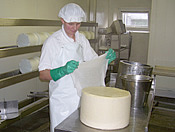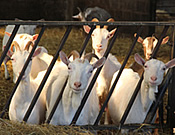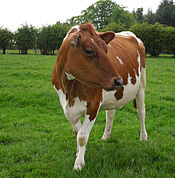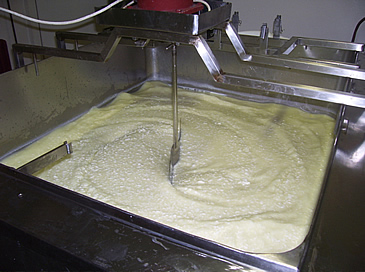The hard pressed cheeses of Dunlop and Bonnet are wrapped in cloth before going into the cheese store.

Here they sit on wooden shelves and mature for 10 to 18 months. During this time they are carefully turned and brushed!!
This is a natural maturing process where the mould grows on the outside and a firm rind develops protecting the cheese inside.
As well as this the cheese itself is developing its texture and flavour.

The soft cheeses of Aiket, Glazert, Paddy’s Milestone and Ailsa Craig on the other hand are ripened in temperature controlled rooms where the bloomy white rind develops on the outside. This in turn will ripen the cheese towards the inside. This ripening takes only a few weeks.

The fresh Crowdie is made and ready to eat or use and requires no ripening or maturing. It has a shorter keeping time than the hard cheese.

Being a small operation with small herds of cows and goats allows us to do both the milking and cheesemaking.

This ‘hands on’ gives us greater control over the hygiene, quality and animal welfare.
Not only are the Ayrshires native to Dunlop area but their milk is particularly suited to cheesemaking. In summer they graze in the fields and the milk produces a deeper golden coloured cheese. In the winter months they are housed in a spacious shed where they have dry comfy beds to lie on and room to roam about and feed. On their winter diet their milk makes cheeses of a much paler colour so we get this change from season to season. The goats’ cheeses are characteristically white with little seasonal variation.
This process of making hard cheese can take about 7 to 8 hours to complete the first stage. The cheese needs time for the acidities to rise and the texture to develop.
The day following the production, the cheeses are wrapped in a cloth and pressed again before being placed in temperature controlled cheese stores where they will mature for many months. Starter and Rennet. The milks are pumped from the farm into cheese vats where it is warmed, the starter bacteria is gently stirred into the milk and left to ripen. With some cheeses this happens overnight, others within minutes. Rennet is added and the milk sets into a jelly like coagulum. |
Once coagulated the curd is cut into small pieces using large stainless steel knives. The curd pieces are now floating in warm whey.
 |
These curd and whey are gently stirred and warmed and when the cheesemaker decides the time is right, the stirrring ceases, the curd then settles to the bottom of the vat. This is called 'pitching'. Now the whey is drained off leaving a mass of curd.
The curds begin to mat together and are then cut by hand into blocks. These are repeadly cut and turned to release the whey. The acidity is rising all the time as the cheese developes the desired texture. |
The blocks of curd are now put through the peg mill to break them down into small chip sized pieces. The salt is then mixed thoroughly into the curd. |
After salting the curds are packed into cylindrical moulds and placed on the press. The pressing removes more moisture. Following pressing, the cheeses are removed from their mould, are carefully cloth bound and then pressed again before being labelled and placed in the store for maturing. |
The cheeses are carefully turned and brushed regularly to ensure even maturation. They will be nurtured in this way for several months before being ready to eat.
The soft cheeses differ from the hard cheeses in that the curd is ladled into the moulds. These are left to drain overnight without pressing. The following day the cheeses are salted by placing them in brine. Ripening is much quicker, weeks rather than months.
After the starter and rennet have been added to the milk, the curd is cut with large knives. The curds are floating in the whey for a while. Then the curds are ladled into plastic moulds which have holes in the side and are open top and bottom. The curds drain overnight and form the shape of the mould. The cheese are turned regularly to ensure the curd is evenly drained. |
The following day the cheeses are placed into a salty solution (the Brine). |
They remain here for a short time before being placed on racks and left to dry off. |
|
Soft cheeses ripen in temperature controlled rooms where they remain for several weeks until ready to eat. |
Milk for soft cheese ripening |
|
Ripened milk/curd being poured into cloth bags.
Bags are hung up to drain
Salt is then mixed into the fresh curds. This cheese is now ready to eat. Yum! |